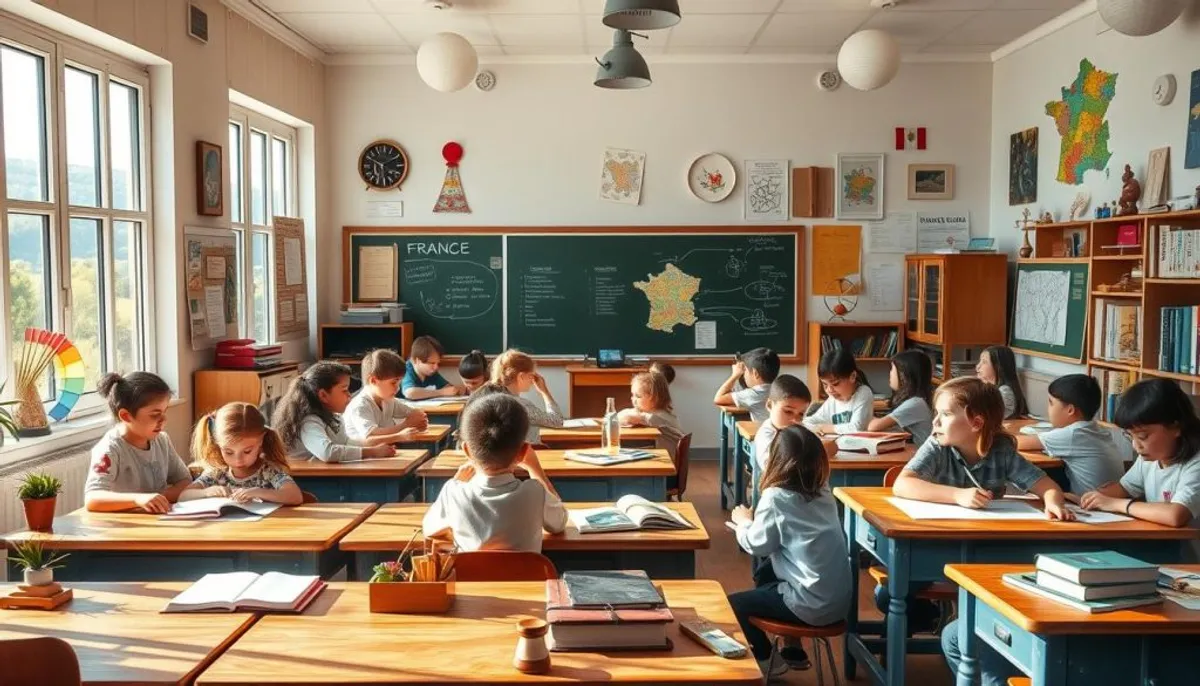Education in France is facing considerable challenges. The school system, in full evolution, reveals complex realities through testimonies. The distance learning, expanding, questions traditional educational methods.
Teachers play a crucial role in these transformations. They must adapt to new requirements while ensuring the quality of teaching. General culture and teacher preparation are essential to secure the future of education.

The school represents a societal project, initiated at home and pursued by professionals. The relationship between education and culture is fundamental. It allows for the formation of critical citizens, capable of questioning the world around them.
In the face of the cultural crisis, the role of the educated educator is put to the test. Experts emphasize the importance of a solid general, disciplinary, and pedagogical culture among teachers.
The current state of education in France
The French educational system is undergoing a major transformation. Pedagogical challenges and school reforms are shaping the current educational landscape. They profoundly impact students, teachers, and society as a whole, while aiming for a true harmony of body and mind.
The challenges of the modern educational system
The French educational system faces major issues. A May 2023 Ifop survey reveals that 6 out of 10 French people doubt the equality of opportunity provided by school. Social inequalities persist, with 70% of children of workers obtaining a vocational or technological baccalaureate, compared to 75% of children of executives for the general baccalaureate.
The role of teachers in the evolution of the school
Teachers play a crucial role in educational transformations. Their training is evolving to integrate new technologies and innovative pedagogical methods. The adaptation to distance courses, particularly following the COVID-19 crisis, has highlighted the importance of their flexibility and capacity for innovation.
The impact of educational reforms
The school reforms aim to improve the efficiency of the system. Today, 79% of an age group obtains the baccalaureate, a significant improvement compared to 1 in 3 students in 1980. The Economic, Social and Environmental Council has proposed 4 axes for a School of success for all, emphasizing the importance of adapting the system to current needs.
These changes in the French educational system reflect a desire to adapt to the challenges of the 21st century. They aim to preserve equity and quality of teaching for all students.
Culture and Training review: in-depth analysis
Reviews of Culture and Training reveal a high level of satisfaction among students. A satisfaction rate of 96% is noted, highlighting the effectiveness of the educational content and materials. This satisfaction is a key indicator of the quality of the school.
The flexibility of distance learning is a major asset. Students benefit from an average duration of 12 months to complete their training, which can extend up to 4 years. This flexibility allows learners to adapt to their personal and professional constraints.

Financial accessibility is another strong point. With a monthly cost starting at 49 euros, the training is accessible to a wide audience. The total hourly volume of 611 hours ensures a comprehensive and in-depth training.
| Criterion | Value |
|---|---|
| Satisfaction rate | 96% |
| Average training duration | 12 months (extendable to 4 years) |
| Total hourly volume | 611 hours |
| Monthly cost | Starting from 49€ |
Feedback highlights the quality of pedagogical support and the relevance of the content. These aspects contribute to the reputation of Culture and Training as a top choice for quality distance learning.
Teacher training: challenges and realities
The training of teachers in France is undergoing a significant transformation. The 2019 law, titled "For a school of trust," marks a fundamental change. It aims to improve pedagogical skills and promote adaptation to educational technologies.
Initial and continuing education
The duration of initial teacher training has been extended to 800 annual hours. Recruitment competitions now take place after the master's degree, ensuring more in-depth preparation. This new approach combines theory and practice, aiming for increased professionalization, inspired by ideas from a Scottish philosopher.
Required skills
Training programs have been revised to meet current requirements. They emphasize mastery of disciplinary knowledge and pedagogy. Future teachers acquire certified skills, essential for a successful collective educational project.
Adapting to new technologies
The integration of educational technologies is essential in teacher training. It meets the demands of the modern educational system and the expectations of students. Trainers must adapt to these changes to impart these skills.
| Year | Number of teachers in professional training | Evolution |
|---|---|---|
| 2000-2001 | 8,124 | – |
| 2009-2010 | 10,020 | +18.9% |
This constant evolution of teacher training and professional training reflects the challenges of the educational system. It aims to establish a common professional culture, adapted to the challenges of modern education.
The learning process and its evolutions
Education is evolving rapidly, adopting new learning methods to meet the needs of modern students. Pedagogical innovation transforms the way we conceive teaching, emphasizing more interactive and personalized approaches.
Innovative pedagogical methods
Today's classrooms integrate advanced technologies and creative teaching strategies. Teachers use digital tools, educational games, and collaborative projects to engage students. This pedagogical innovation stimulates curiosity and encourages active learning.
Statistics show the positive impact of these innovative approaches:
- 92% of companies adopting these methods are more innovative
- 37% report an increase in productivity
- 58% are better prepared for future skill demands
The importance of personalized support
Individualized school support is gaining importance. Teachers recognize that each student has unique needs and adapt their approach accordingly. This tailored support helps students progress at their own pace and develop their confidence.
The benefits of personalized support are numerous:
- 7 out of 10 students feel more connected to their learning
- 34% of schools better meet students' needs
- 26% observe an improvement in the quality of students' work
These evolutions in learning methods and school support better prepare students for the challenges of the modern world, fostering their future success.
The school-family relationship: an essential partnership
Cooperation between the school and parents has become an essential foundation of current education. Research shows that 82% of teachers see meetings with parents as an indispensable means to help struggling students. This collaboration is not limited to occasional meetings. It aims to establish a favorable environment for learning in the child and to develop crucial skills.
Parental involvement is crucial for the child's academic success. They are encouraged to closely monitor their children's progress and to foster autonomy, responsibility, and hard work. These actions strengthen the solidarity between the school and the family, creating a united educational community.
Consistency between school and family culture is a major asset for success, according to experts. This synergy strengthens the support provided to the student and creates a conducive environment for their development. Thus, the collaboration between the school and the family becomes a determining factor in ensuring the best conditions for children's success.
The challenges of post-COVID education
The COVID-19 pandemic has profoundly transformed the educational sector in France. In the face of post-pandemic education, many challenges arise, particularly adapting to distance learning and preserving students' well-being. These changes highlight the need for increased flexibility in the educational system.
Adapting to distance courses
Distance learning is now an unavoidable reality. A meta-analysis reveals that this method can be as effective as in-person teaching. However, obstacles remain:
- Technical difficulties accessing the Internet for some students
- Existence of white zones without high-speed connection
- Server overloads and fragility of digital workspaces

New pedagogical approaches
Post-pandemic education requires a reevaluation of teaching methods. Teachers must train in digital skills and adopt innovative approaches. Studies indicate that the use of digital tools can enhance students' 4C skills: Communication, Collaboration, Critical thinking, and Creativity.
Managing stress and anxiety
Students' well-being is now a major concern. The transition to online learning has generated stress for many students. Initiatives have emerged to support learners, such as the creation of online learning tools by the students themselves, demonstrating their adaptability.
| Challenge | Impact | Potential solution |
|---|---|---|
| Inequal access to the Internet | Widening educational inequalities | Investment in digital infrastructure |
| Teacher training | Difficulties adapting to online teaching | Continuing education programs in digital skills |
| Student stress | Decreased motivation and performance | Enhanced psychological and pedagogical support |
Towards a more inclusive and equitable school
Education in France is moving towards increased inclusion and equity. Efforts aim to ensure access to education for all, regardless of origin or abilities. This approach values the diversity of students and their unique learning paths.
Access to education for all
Notable progress has been made for the inclusion of disabled students. The number of disabled students in regular schools has increased by 24%, reaching 430,000. The number of Accompanying Persons for Students with Disabilities (AESH) has increased by 42%.
The budget allocated to inclusive education has surged by 66%, reaching 3.5 billion euros since 2017. This increase illustrates the commitment to reinforced educational equity.
The diversity of learning paths
The diversity of students is recognized by the creation of new ULIS programs, increased by 20%. These units offer learning paths adapted to the specific needs of students.
However, challenges remain. Students in ULIS exhibit notable difficulties in mathematics, reading, comprehension, and language tools. These figures highlight the need to refine teaching methods to meet the diverse learning needs.
| Field | Percentage of ULIS students in difficulty |
|---|---|
| Mathematics | 84.9% |
| Reading and comprehension | 83.2% |
| Language tools | 87.2% |
Conclusion
The future of education in France is shaping through educational reforms and pedagogical innovations. The school of the future is built on the foundations of a more inclusive and personalized approach. It is adapted to the needs of each student. The positive feedback from learners at Culture and Training illustrates this evolution.
Statistics reveal an impressive satisfaction rate: 96% of students appreciate the quality of their distance training. This success is explained by the diversity of courses offered. They range from medical secretarial work to preparation for the CAP AEPE. The effectiveness of individualized follow-up also plays a key role.
The educational reforms are bearing fruit, as evidenced by the success of learners in final exams. The school of the future, embodied by institutions like Culture and Training, offers opportunities for professional retraining. It also provides personal fulfillment, paving the way for a promising educational future for all.
RelatedRelated articles


